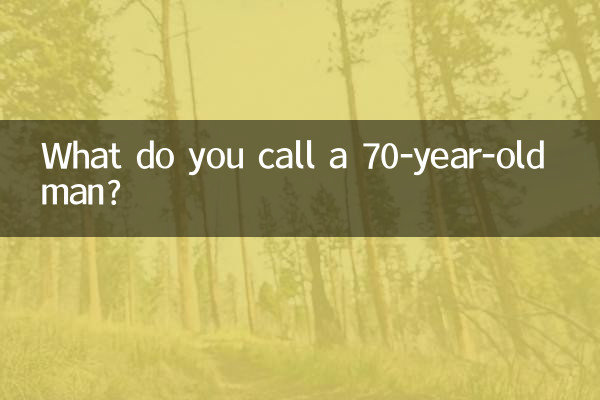What do you call a 70-year-old man? Discuss traditional and modern honorifics
With the development of society, people's names for the elderly are also constantly changing. How to appropriately address a 70-year-old man, which not only reflects respect but also conforms to the characteristics of the times, has become a topic of concern to many people. This article will analyze this issue in detail for you based on the hot content on the Internet in the past 10 days.
1. Traditional honorific methods

In traditional Chinese culture, there are strict etiquette rules for addressing the elderly. The following are common traditional honorifics:
| title | Applicable scenarios | Remarks |
|---|---|---|
| old gentleman | Formal occasions, written language | Suitable for men with knowledge or social status |
| old lady | daily spoken language | Commonly used to address ordinary elderly women |
| grandpa/grandma | Children's terms or endearments | with a sense of intimacy |
2. Modern popular names
With the development of the times, more ways of calling have appeared that keep pace with the times:
| title | Applicable scenarios | Features |
|---|---|---|
| uncle/aunt | daily communication | Close the distance and look younger |
| A certain old man | Professional fields | Such as "Mr. Zhang", "Mr. Li" |
| teacher | Universal | Suitable for various occasions |
3. Hot topics on the Internet
In the past 10 days, the topic of titles for the elderly has sparked widespread discussion on social media:
| platform | Discussion hot spots | Main point |
|---|---|---|
| #How to address the elderly appropriately# | Young people are more likely to use younger titles such as "uncle and aunt" | |
| Zhihu | "Is it appropriate to call a 70-year-old man 'uncle'?" | Experts recommend choosing an appropriate title based on the occasion and relationship. |
| Douyin | Elderly blogger’s reaction to address | Most elderly people say they don’t care about the specific title, but more about the tone and attitude. |
4. Things to note when choosing a title
1.occasion factors: It is appropriate to use traditional honorifics such as "Mr." in formal occasions, but can be more casual in daily communication.
2.Regional differences: "Uncle/aunt" is commonly used in the north, while "grandpa/grandma" is commonly used in the south.
3.personal preference: Some old people prefer to be called younger, and you can adjust it by observing the other person's reaction.
4.Tone and attitude: More important than a title is respect and kindness when expressed.
5. Survey data on intergenerational differences
According to the latest online survey, there are obvious differences in the preferences of different age groups for the names of the elderly:
| age group | preferred title | second choice title |
|---|---|---|
| 20-30 years old | Uncle/Aunt (68%) | Teacher(22%) |
| 31-50 years old | Teacher(45%) | Old gentleman/old lady (35%) |
| Over 51 years old | Brother/Sister (52%) | Someone old (28%) |
6. Expert advice
Sociologist Professor Wang pointed out: "The names given to 70-year-olds should keep pace with the times, but the core is to show respect. It is recommended that young people try to ask the elderly for their preferences and use the names that the other person feels comfortable with. At the same time, with the arrival of an aging society, we need to establish a more diverse and inclusive system of names."
7. International Comparison
Other countries also have practices worth learning from when it comes to addressing the elderly:
| country | common titles | cultural characteristics |
|---|---|---|
| Japan | さん(Mr./Ms.) | maintain a high level of courtesy |
| USA | Mr./Ms.+surname | Emphasis on equality and individual choice |
| South Korea | 할아버지/할머니(grandpa/grandma) | Pay attention to the order of elders and younger ones |
Conclusion
There is no absolute standard answer for addressing a 70-year-old man. The key is to express sincere respect. In a rapidly changing society, we must not only inherit the traditional virtue of respecting the elderly, but also adjust our expression methods with the times. The best thing to do is to observe the specific situation, feel the other person's reaction carefully, and find the most appropriate way of addressing you.

check the details

check the details